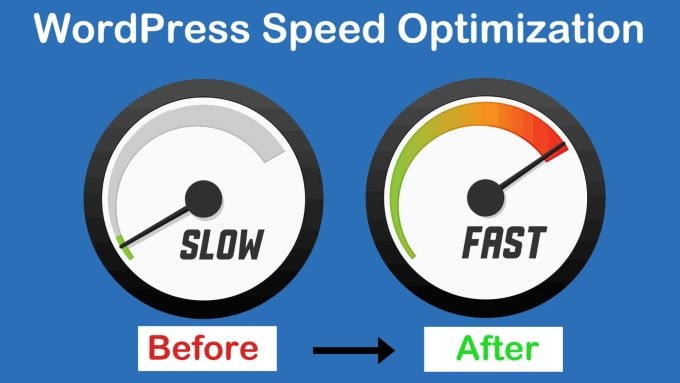WordPress websites are born to fly. Why do so many of them drag along the ground, then, and keep losing customers to slow speeds? Because they need the right approach to speed up!
Ways to improve WordPress website performance
Different ways to speed up WordPress are applied on a case-by-case basis, after the detailed analysis of a site. However, we would like to share most common ones that are useful for many sites. Here we go!
- Using the right WordPress caching plugins
Your website performance will increase significantly from the proper use of caching. This technique means lets you deliver your pages to your users faster by saving the copies of requested files after the user’s previous visits. There are useful plugins that can help with caching, such as W3 Total Cache, WP Super Cache, WP Fastest Cache, Hyper Cache, WP Rocket, and many more.
- Minifying and concatenating your JavaScript and CSS files
JS and CSS minification and concatenation is something that previously mentioned plugins can do, but this deserves a special item.
JavaScript and CSS files should load efficiently without hampering your site performance. It is recommended to minificate them by removing unnecessary characters. These characters include comments, block delimiters, white spaces, line breaks, indentation, and so on. The files should be grouped together to reduce the number of HTTP requests.
Useful JS and CSS minification and concatenation plugins include BWP-Minify, Autoptimize, W3 Total Cache etc.
- Using tools like Memcached or Redis
In server-side optimization, special attention needs to be paid to using open-source, in-memory data storage systems like Redis and Memcached. This is another awesome way to improve WordPress website performance. Our developers can advise you which to choose, and perform the integration.
- Applying GZIP compression
You will also need GZIP compression of Javascript, CSS, and web pages. The files can be compressed by up to 70 percent and still easily read by the browser. Compression can be performed by caching plugins WP Rocket, WP Total Cache or on the server.
- Using CDN for quick content delivery
An awesome way to improve WordPress website speed is to use a CDN (content delivery network). CDNs are networks of servers located across the globe. They cache your static content (JS files, CSS files, images) and immediately deliver it to users from the servers closest to them. It is also possible to just select the geographical areas of interest.
- Optimizing your site images
Images are meant to attract and inspire users, but they can also impact performance. Luckily, you needn’t sacrifice image quality for speed, because there are great image optimization techniques. Some of them include:
- choosing the right format between JPEG, PNG, and GUF
- specifying exact dimension
- compression without loss of quality
These processes can be handily automized. Useful plugins for this include Imagify Image Optimizer, Smush Image Compression and Optimization, EWWW Image Optimizer, Compress JPEG & PNG Images, and more. Developers also love special optimization programs on the server.
- Lazy loading your content, images, and videos
Here is one more great way to save your website’s resources and speed up WordPress performance. Lazyloading means that the assets that are on the user’s screen do not need to be loaded. They only load when the user scrolls to reach them. These assets include content, images, videos, and even Disqus comments. Useful plugins are BJ Lazy Load, Unveil Lazy Load, Lazy Load For Videos, Disqus Conditional Load, and so on.
- Removing the unnecessary or “heavy” plugins
A great means to boost site performance is to use as few plugins as possible. This requires a good audit. It may show that some of them are outdated, unnecessary, or too cumbersome for your site. They will need to be uninstalled or replaced with alternatives.
- Doing a good code clean-up
It is often the case that performance goes down because of pitfalls in the PHP code. For example, unnecessary requests to the server are made because of code duplication. We are ready to examine your code and clean it up in accordance with the standards and logic to improve performance.
- Optimizing your website database
For better website speed, your database should be kept in order and cleaned up from unnecessary data. This includes post revisions, comments, duplicated metadata, unused terms, and much more. Plugins like WP Sweep, WP-DB Manager, WP Optimize could be helpful in this.
- Keeping your WordPress core, plugins, and theme updated
Updates to WordPress core are meant to enhance security, fix bugs, and, of course, improve website performance. With every update, the WordPress team enhances the ways your website handles and delivers content to users. So every time there is an update available, it should be applied. This is also true for the plugins and the active theme that your site is using.
- Disabling the hotlinking
Hotlinking is a term that means that one website uses the content (for example, images) stored on another site’s servers. The latter may experience performance losses due to increased server load. It is necessary to prevent hotlinking to your website, which can be done in your .htaccess file.
- and Most Importantly, Move to SSD!
In SSD web hosting, servers don’t have moving parts, and therefore the data transfer speed is relatively very high. It is ideal for websites with multiple applications running concurrently. GoSSDHosting offers cheap yet super fast Web Hosting Plans.
Conclusion
With the above-mentioned ways, you can boost your website performance up to 10x times. Together, they should put your site on a fast track to higher rankings, and better experiences for your visitors.

